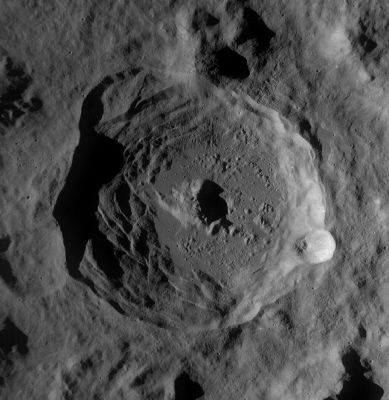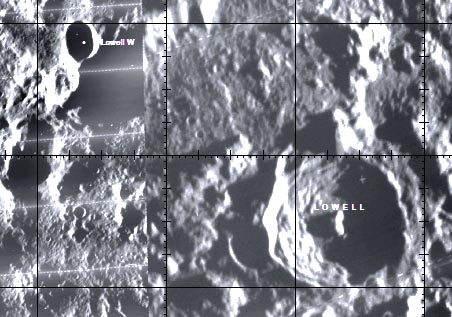Lowell
Contents
[hide]- 1 Lowell - with impact melt lobes on its floor
Lowell - with impact melt lobes on its floor
| Lat: 13.01°S, Long: 103.37°W, Diam: 62.65 km, Depth: km, Rükl: (farside) |

Left: LROC image WAC No. M118166068ME. Calibrated by LROC_WAC_Previewer.
Images
LPOD Photo Gallery Lunar Orbiter Images Apollo Images
Maps
(LAC zone 90D3) USGS Digital Atlas PDF
Description
Wikipedia
Correct link for lunar Lowell crater (not to be confused with Lowell on Mars!).
Additional Information
- IAU page: Lowell
- Central peak composition: GNTA1, GNTA2 & AG (Tompkins & Pieters, 1999)
Wonderful system of coagulated impact melt lobes at the southeastern inner slopes of Lowell
The source of these melt lobes seems to be a nameless oblique-impact crater at the southeastern part of Lowell's rim.
See this LROC-NAC close-up of a very small part of this lobe-system inside Lowell:
http://bit.ly/2fcKcId (source: LROC ACT-REACT QUICK MAP).
See also LROC post number 483 from april the 12th, 2012; an article from Drew Enns:
http://lroc.sese.asu.edu/posts/483 (article IMPACT MELT LOBES).
Nomenclature
Percival Lowell (March 13, 1855 - November 12, 1916) was an American businessman, author, mathematician, and astronomer who fueled speculation that there were canals on Mars, founded the Lowell Observatory in Flagstaff, Arizona, and formed the beginning of the effort that led to the discovery of Pluto 14 years after his death.
LPOD Articles
Lettered craters

LAC 90 view. Excerpt from the USGS Digital Atlas of the Moon.
Bibliography
Percival Lowell in the Sourcebook Project (William R. Corliss)
- The list of articles about (and from) Percival Lowell which were printed in the book Mysterious Universe, a handbook of astronomical anomalies (W.R.Corliss, 1979), is a rather long one, because Lowell played an important role during the era of the so-called Canals of Mars.
I shall try to create this list of articles within (perhaps) a couple of months...
- DannyCaes Mar 5, 2015
- Explanation of the Supposed Signals from Mars of December 7 and 8, 1900 (Popular Astronomy, 1902).
Named Features -- Prev: Lovell -- Next: Lubbock